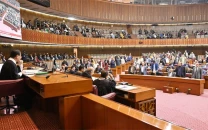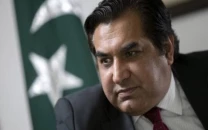JCP drafts judges' appointment rules
Procedure and criteria for appointments set to be reviewed on Dec 21

The Judicial Commission of Pakistan's (JCP) rule-making committee has prepared its draft rules concerning the regulation of procedures for the assessment, evaluation and fitness of judges appointed to superior courts.
The committee, chaired by Supreme Court Justice Jamal Khan Mandokhail, includes Attorney General for Pakistan Mansoor Awan, Senator Ali Zafar, and Pakistan Bar Council (PBC) member Akhtar Hussain.
In a meeting held on December 6, the JCP unanimously authorised Chief Justice of Pakistan (CJP) Yahya Afridi to form a committee responsible for drafting the rules.
Prior to this, SC senior puisne judge Justice Syed Mansoor Ali Shah had expressed concerns about appointing judges to superior courts without a set of defined JCP rules.
Sources said that the committee almost finalised the rules during a meeting on Monday. "The draft rules, subject to approval from the JCP, are expected to be posted on the Supreme Court website today (Tuesday). The JCP will review the draft on December 21 for approval," said one member of the committee.
The rules largely reflect the proposals originally drafted by Justice Mansoor Ali Shah, which were considered by the commission before the passage of the 26th Amendment.
Moreover, the committee discussed the possibility of introducing secret voting for JCP members during the nomination process. Both options are now included in the draft rules, according to one of the members.
It is likely that nominations for the appointment of superior court judges will be invited again following the approval of the proposed rules. The commission is set to meet again to consider nominations for judges to five high courts.
After the passage of the 19th Constitutional Amendment, judges, particularly Chief Justices, gained significant dominance in the judicial appointment process. This was further reinforced through the framing of the JCP Rules, 2010.
Despite consistent demands from superior bars to amend these rules, judges maintained control over the appointment process.
Former Chief Justice Qazi Faez Isa formed a committee led by Justice Syed Mansoor Ali Shah to propose amendments to these rules. Before his retirement, Justice Isa had called for a meeting of the commission to review the proposed draft rules shared by Justice Shah's committee.
In October, the 26th Amendment passed, increasing the role of the executive in the appointment process.
Meanwhile, Justice Syed Mansoor Ali Shah has already expressed concerns about the perception of political influence and court-packing within the superior judiciary.
The executive has succeeded in nominating its preferred judges to the constitutional benches of the apex court and the Sindh High Court. Ruling political parties and superior bars are keen on securing their share in the appointment of superior court judges.
It remains to be seen how the JCP rules will ensure merit-based appointments in the face of political and institutional pressures.





















COMMENTS (1)
Comments are moderated and generally will be posted if they are on-topic and not abusive.
For more information, please see our Comments FAQ